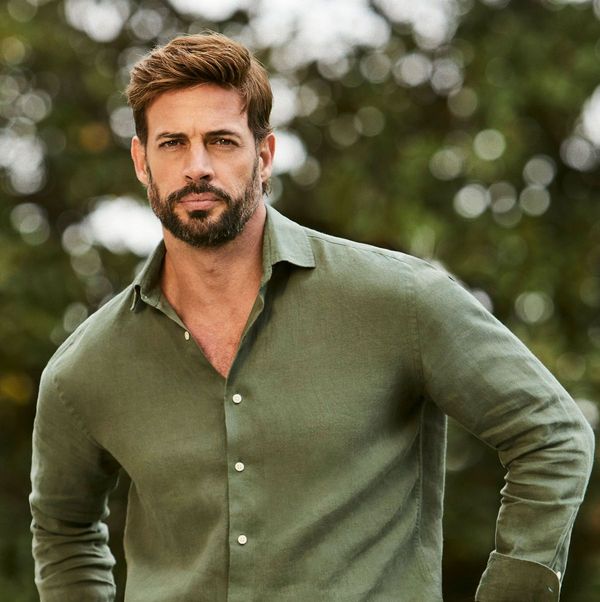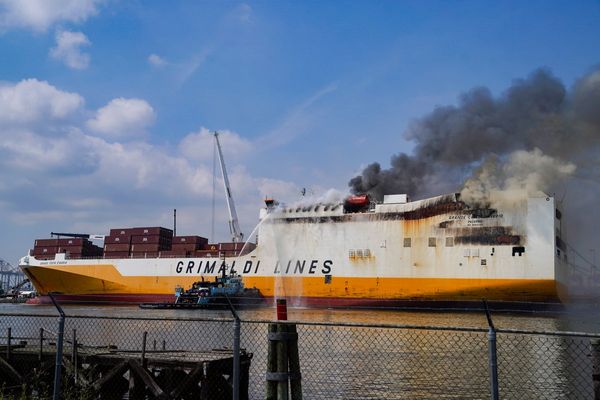
The Cannes film festival opens just as the heavens do, too. It’s raining on the red carpet and on the black limousines and on the immaculate white pavilions that line up on the beach. The rain falls on the A-listers as they climb the stairs to the Palais, and on the stoic huddled masses who gather behind the police cordons. Everybody’s bedraggled and windswept; it feels as though the whole town’s been at sea. “My main wish is that we see some great films this year,” says Iris Knobloch, the festival’s president, casting an anxious eye at the sky. “But also I’m wishing for a little sunshine as well.”
If it’s raining in Cannes, it means there’s a glitch in the script. It’s one of the event’s in-built paradoxes that a festival which predominantly plays out in darkened rooms should be so dependent on good weather; so in thrall to its complementary circus of photocalls, yacht parties and open-air film screenings. All it takes is a downpour to trigger a disturbance in the force, a creeping sense of existential dread. The punters came expecting Technicolor. But the scene is all wrong: the world has gone monochrome.
Fittingly enough, the early films fizz and sputter. Quentin Dupieux’s The Second Act is a flyweight piece of metafiction that casts Léa Seydoux, Louis Garrel and Vincent Lindon as squabbling movie actors who can’t help breaking character. Rúnar Rúnarsson’s When the Light Breaks, meanwhile, is a heartfelt, moping Icelandic drama that trails a lovelorn art student through the immediate aftermath of a tragedy. Both pictures are perfectly serviceable in their way. But they do little to lift the prevailing mood of despond.
The Cannes organisers, though, like to save their first big firework for the middle of week one. Sometimes these films explode with a satisfying bang (Top Gun: Maverick in 2022) and sometimes they fold and collapse in on themselves (Indiana Jones, just last year). Furiosa: A Mad Max Saga, praise be, belongs in the first category.
Shot nine years after Fury Road, but structured as a prequel, Furiosa is the flamboyant, prog-rock fifth instalment in the Mad Max cycle, casting wide-eyed Anya Taylor-Joy as George Miller’s “dark angel” of vengeance. She’s kicking up dust clouds in the rust-coloured desert. She’s gliding from one thunderous set piece to the next. Co-starring as the demagogic Dementus, Chris Hemsworth cavorts through the action like a drunken Thor. It’s clear that these two berserkers are on a collision course, although Miller is in no great rush to get us there. His film takes the scenic route through post-apocalyptic Australia, from Gastown to the Citadel to Bullet Farm and back again.
Naturally, this makes for a different kind of Max movie – because if Fury Road was the chase, Furiosa is the roadmap, the liner notes, the whole bulging backstory. Its digressive nature has irked some viewers here, who feel it amounts to a narrative wheelspin. But I really liked it. Miller has fashioned such a colourful, fabulous world – a vast termite mound of scavengers and predators – that he can be forgiven for wanting to show the place off in all its glory. It’s a great place to visit. I’m not sure I’d want to live there.
Ahead of the unveiling, experts were billing the 77th Cannes film festival as a commemorative swansong for “New Hollywood”, a grand final bow for the generation of American movie brats who turned the industry on its head back in the early 1970s. George Lucas is here to pick up an honorary Palme d’Or. Paul Schrader sits on the schedule with his elegiac Oh, Canada; Francis Ford Coppola sits beside him with his elephantine, spectacularly messy Megalopolis. On the ground, though, this festival already feels more youthful and female-friendly than in previous years. Barbie director Greta Gerwig is enthroned as jury president, Meryl Streep has hosted an onstage masterclass, while Judith Godrèche’s #MeToo exposé (Moi Aussi) screens at the Cinéma de la Plage. No doubt the organisers have arranged these elements to be prominently on display. But these optics still matter; they suggest a direction of travel. Going by current evidence, Cannes at least has its window display in good order.
One of the first films off the rank in the chase for the Palme d’Or is Wild Diamond, from debut director Agathe Riedinger. It’s a bullish, social-realist account of celebrity martyrdom, framing its Instagram posts like the sacred text from the Book of Kells as it follows the fortunes of 19-year-old Liane (Malou Khebizi), who dreams of appearing on reality TV and becoming “the French Kim Kardashian”. But while Riedinger’s drama packs a punch, the handling is strident, one-note and verges on the condescending. Liane likes to joke that some people – bad people – are as fake as her breasts. Regrettably, I worry that Wild Diamond is too.
Bird, by the British director Andrea Arnold, hails from the same kitchen-sink school as Wild Diamond, but it’s about three classes ahead; supple and sensitive, even as it touches on the knotty issue of neurodiversity in its depiction of a modern-day holy fool. Franz Rogowski (channelling the spirit of the young Mark Rylance) plays the title character, who materialises in the meadow like Puck of Pook’s Hill, much to the consternation of 12-year-old Bailey (Nykiya Adams), who lives in a nearby squat with her rackety dad (Barry Keoghan). Ostensibly, Bird is searching for his lost family, but it may be that he’s the one who has blown in from the past; the fragile representative of an ancient English mysticism that’s barely clinging on amid the estates and A-roads of north Kent.
Bailey needs a friend. Her life is a mess; her prospects all but nonexistent. As for Bird’s position, it’s arguably more precarious still. The film is too smart and too careworn to provide easy answers. But it treats its people with compassion and respect, plus the occasional dash of magic. It’s been eight years since Arnold last came to Cannes with a narrative feature (the excellent American Honey). In her way, she’s just as precious and elusive as Bird.
For all that, I think my favourite picture from these opening days remains The Girl With the Needle, an expressionistic black fairytale haunted by the ghosts of the first world war and stumbling across every manner of monster in the shadows. Up a cobbled street in 1920s Copenhagen you find Dagmar’s Deli, which sells jars of liquorice and nougat but is actually a front for the trafficking of newborn infants. Vic Carmen Sonne is the harried former factory worker who instals herself as a wet nurse, bonding with the babies before they are all batted on to an uncertain future up another of those infernal winding cobbled streets. I suspect Magnus von Horn’s film won’t win the Palme d’Or; I think that Gerwig’s jury will find it too unremittingly bleak. But the drama blazes with a fierce intensity, while its revelations fall like hammer blows. The audience staggered from the cinema knock-kneed and in shock.
On the first full day of the festival, the city’s wifi sparked out. In the hotels and cafes, the guests thumbed their phones in a panic. Out on the Croisette, people hunkered down with umbrellas. The 77th Cannes film festival was off to a choppy, troubled start. But the forecast is hopeful; the sun’s already breaking through. Here’s hoping for blue skies, great films and the ultimate fairytale payoff: an honest-to-goodness happy ending.
Coming attractions
Horizon: An American Saga (screens on Sunday 19 May)
Kevin Costner rides into town after a 20-year absence to unveil his epic tale of how the west was won. Settle back, this could take a while. Horizon clocks in at three hours and this, we are assured, is merely the saga’s first half.
The Apprentice (Monday)
The stench of sulphur surrounds Ali Abbasi’s New York drama about a scheming old demon and his gauche, eager protege. Jeremy Strong plays the notorious attack-dog lawyer Roy Cohn. Sebastian Stan rides shotgun as the young Donald Trump.
The Substance (Monday)
Those on the hunt for red-meat thrills are advised to catch Coralie Fargeat’s feminist body horror; reputedly a dark satire on the beauty industry and a thematic cousin to the 2021 prize winner Titane. Demi Moore and Margaret Qualley are the stars who suffer for their art.
All We Imagine as Light (Thursday)
Indian cinema had been shut out of Cannes competition for the past three decades before Payal Kapadia’s human drama bucked the trend. This spins the tale of two Mumbai nurses who light out for a new life in a ramshackle beach town.
The Seed of the Sacred Fig (Friday)
Staring down the barrel of an eight-year prison sentence, the dissident Iranian director Mohammad Rasoulof fled his homeland last week. His latest work is competing for the crowning Palme d’Or. Rasoulof hopes to attend the premiere in person. XB







